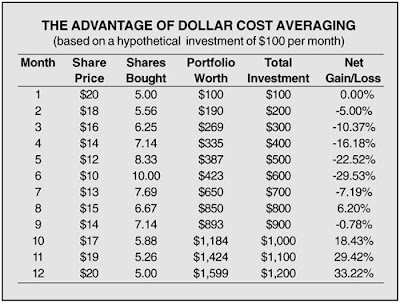
Have you ever dithered around for hours on a regular basis trying to decide what this unpredictable little devil called the stock market will do next? "Oh no! What if I invest now, and it goes down, or what if I don't and it goes up and I miss out?"
If you have done any investing in the past, of course you have. I'm about to give you an investing tip which will help you to make the right decision at the right time, every time. What's more, it takes next to no work from you to achieve, and you can spend all that wasted time relaxing or looking for other opportunities.
It is a fairly well known and accepted technique called "Dollar-Cost Averaging".
How does it work? Well the basic idea is that you invest a certain regular amount of money into a particular investment. That's it. Seriously.
It goes like this. Say I invested $100 a month in a product of my choice that I thought would do ok. The first month, the price was $1 per share, so I bought 100 shares. The second month, SHOCK HORROR (!!), the value of the product has fallen by 25%, and the units are now worth $0.75 each! Your first reaction would be one closely resembling a heart attack. Justifiably so, as the value of your investment is now $75. Instead of cutting and running though, you stick to your guns, and purchase another $100 worth of shares, being around 133 shares. You continue like this for a few months, and gradually the price of your product begins to rise again. Eventually, YAY, the value has reached $1.25 per unit. As this is the highest you have ever seen this share rise to, you usually would not buy, right? Well let's just say that you once again stick to your guns, and buy another $100 worth of shares, equating to 80 shares.
Can you see where this is heading? You have effectively bought more units when they were cheap, and less when they were relatively expensive. Congratulations, you have successfully predicted the moves of the market, and invested accordingly.
The fact is that it is very difficult for even investment professionals to predict what a particular fund is going to do, as there are so many variables. Those that do know will often keep this information close to their breast with a greedy little glint in their eye. The best most of us can do is to simply be lucky. If you don't want to leave it down to luck, then Dollar-Cost Averaging is the way to go.
Here is a table showing the benefits of this technique:
 Thus, if you had invested a lump sum of $1200 initially at $20 dollars per share, that's exactly what it would be worth 12 months down the track. However, with dollar-cost averaging at work,
Thus, if you had invested a lump sum of $1200 initially at $20 dollars per share, that's exactly what it would be worth 12 months down the track. However, with dollar-cost averaging at work, you would have made 399 dollars profit even though the share never got above the initial purchase price again. Nice huh?
The down side:
If you invested a lump sum of $1200 initially, and the share price just went straight up from there without dropping below your initial purchase price, you would never make the same profit through dollar-cost averaging (DCA). Sound risky though? It is. How often have you predicted movements like this? At least if your investment went down in value, you would have invested less money in the high period with DCA.
The logical side:
If you are investing any reasonable amount of money, you would catch on to something. How often do you have a large lump-sum just laying around doing nothing? Not very often indeed. Often DCA is the best solution simply because it enables you to begin investing sooner. It will certainly benefit you if you cant afford to make an initial outlay equal to the amount you could have invested through DCA.
The requirements of DCA? A regular income from which you can reliably make that same investment per period, and a lot of discipline. Also, it would be beneficial if you found a product with low/no fees for additional investment.
One last thought, as you can see from the above, DCA will work best for volatile products: those that are especially unpredictable and often violent in their movements.
In my mind, making use of DCA would take a lot of the stress out of investing, which means that you would live longer to enjoy the proceeds!
Take it easy.
No comments:
Post a Comment